USA Today Audience Editor Sydney Bergan ’23 Lands ‘Surreal’ Olympic Assignment
The internship that launched Sydney Bergan ’23 on a path to covering the upcoming Summer Olympics in Paris, France, started off on an unexpected trajectory.
As a junior at Syracuse University, Bergan landed an internship through the prestigious Dow Jones News Fund with McClatchy, but instead of serving as a reporter—which was her career ambition—Bergan was assigned to the digital media program as an audience engagement intern.
Bergan spent 10 days enhancing her digital media literacy skills at Arizona State University, taking curated stories and repackaging them for different audiences. From there, Bergan worked as an intern for The Charlotte Observer and The News & Observer. Before long, The Sacramento Bee hired her as an audience editor while she was still enrolled in classes at Syracuse. Now, she’s an audience editor for USA Today.
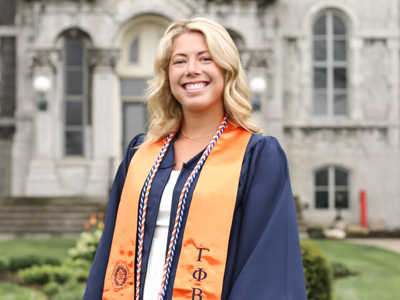
Being an audience editor was the perfect blend of content creation and newsworthiness. Bergan excelled by understanding how to create stories that resonate with audiences, and she enjoyed having conversations with people about what types of content they want to see.
“I thought of myself as a reporter and I always knew I loved people and telling their stories,” says Bergan, who earned a magazine, news and digital journalism degree from the S.I. Newhouse School of Public Communications.
“But once I started, I just fell in love with the audience engagement work. I love the content creation and curation side of journalism. It allows me to be creative. I do a lot of content design for USA Today, coming up with stories that will reach our audiences wherever they’re looking for their content. I love looking at the analytics to see what stories, videos or graphics perform well and which ones don’t. It’s all so fascinating.”
Her next assignment will take her to Paris to create content around the Summer Olympics for USA Today. It’s a dream come true for Bergan.
“I love the Olympics. Always have. It’s crazy I’ll be covering the Summer Olympics! It just feels so surreal,” Bergan says. “I worked hard to get here, and I know I’ve got this, but there’s some imposter syndrome at play. This is a big deal. I’m working with journalists who have covered the Olympics many times before. I’m the new kid on the block and am just trying to learn as much as I can and soak it all in.”
Orange at the Olympics
All eyes are on Syracuse University as students, faculty and alumni make their way to France to participate in the 2024 Summer Olympics. Whether competing in one of 32 sporting events, serving as on-air commentators or working behind-the-scenes for NBCUniversal’s coverage of the Games, following the Olympic Torch Relay or presenting at an international symposium, the Orange are well represented.
Most of the action takes place in Paris, where the modern Olympics were conceived 130 years ago. The “City of Light” has since hosted the Summer Games in 1900 and 1924. In a first, this year’s events are being held amidst famous Parisian landmarks, like the Eiffel Tower, the Palace of Versailles and Place de la Concorde.
Students Contribute Behind the Scenes
The Summer Olympics provide hands-on learning opportunities for undergraduates, especially those in the S.I. Newhouse School of Public Communications and Falk College. Nico Horning ’26, a junior majoring in broadcast and digital journalism (BDJ), is interning at NBCUniversal’s Stamford Studios in Connecticut. As a programming runner, he gathers highlights, stats and predictions for NBC Sports’ coverage of the Games.
“This internship supports my dream of becoming a TV sports commentator,” says Horning, who credits the Newhouse School’s alumni network for getting his foot in NBC’s door. “I want to learn as much as I can.”
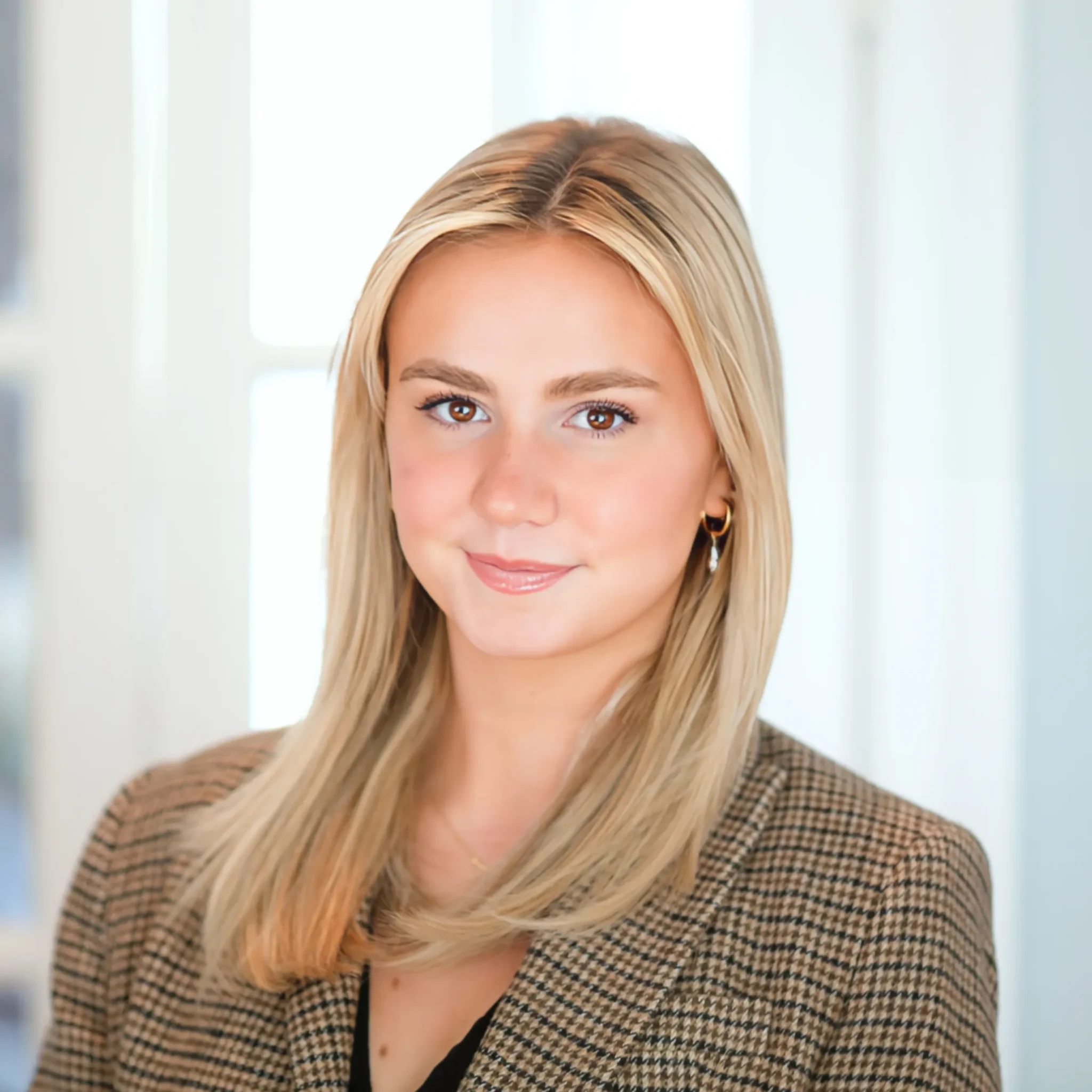
Fellow BDJ major Margaret McCann ’25 is in Paris working for the Acton Style Group, whose clients include NBC Sports. “I’m in NBC’s production studios, assisting with wardrobe and brand management any way I can,” says the CitrusTV social media team member. “This is truly a once-in-a-lifetime opportunity.”
Other interns include Marguerite Bellotti ’26 (BDJ) at NBC Sports and Livia McQuade ’25 (sport management) at Olympus Sports Group.
Syracuse Alumni Report the Action
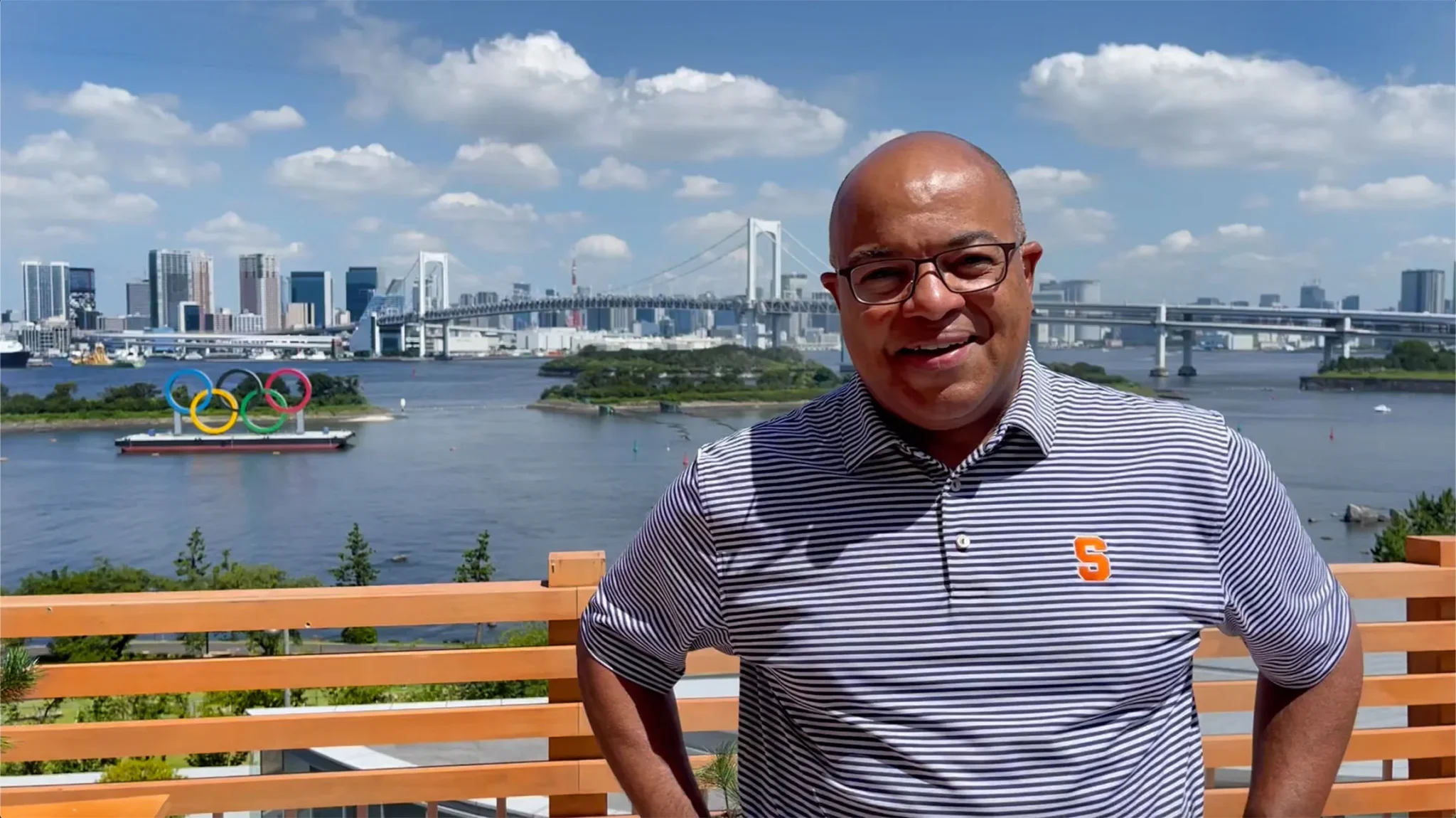
When Mike Tirico ’88 returns to anchor NBC Sports’ primetime coverage of the Olympics, he’ll continue a tradition begun by Bob Costas ’74 more than 30 years ago.
Other alumni commentators this summer include:
- Noah Eagle ’19 (men’s and women’s basketball)
- Ahmed Fareed ’02 (NBC daytime host)
- Jason Knapp ’91 (swimming)
- Andrew Siciliano ’96 (NBC Gold Zone co-host)
- Bill Spaulding ’13 (track and field)
- Scott Hanson ’93 (NBC Gold Zone co-host)
NBC’s Voice of the Olympics Mike Tirico ’88: Memorable Olympic Moments and a Love for All Things Orange
When the Olympic Games begin later this month, one of the University’s best-known alums will be front and center. In many ways it’s a role Mike Tirico ’88 knew he wanted at an early age.
“My mom will tell you, even as a little kid, I was walking around pretending to be a sportscaster,” he says. “This is what I wanted to do in life.”
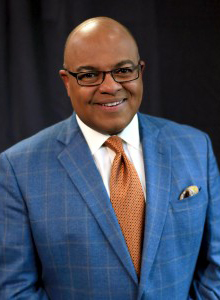
As the athletes prepare for competition, Tirico is preparing to anchor NBC’s daily Olympics coverage as he’s done since 2016. But as most broadcast fans know, Olympics studio host is only part of the Tirico portfolio, which includes “Sunday Night Football,” PGA golf, and thoroughbred and Indy racing among others. Those sports he knows well. This summer he’ll be put to the test with new Olympic sports, all while trying to avoid making waves.
“Surfing is happening in Tahiti at the Olympics, I put up my hand to volunteer to be the surfing correspondent,” says Tirico, who adds with a smile that “for some reason, they went with Colin Jost from ‘Saturday Night Live.’ I don’t know what I should read into that but it’s fine.”
Break dancing is another sport new to the games and according to Tirico a sign of the athletic times. “It does speak to what the Olympics does in trying to reach out to new generations and keep the youth of the world involved,” he says. “There was a time that snowboarding came in the Olympics and people were asking why. Now, snowboarding is one of the cornerstones of the Winter Olympics.”
In this “’Cuse Conversations” podcast, Tirico talks about getting ready for the games, his sleep schedule while in Paris (it’s rough), his commitment to helping our young broadcast students and, as a first-generation student who met and married his wife here, his love for Syracuse University.
Master’s Alumni Profile: Jordan Bonaparte
Jordan Bonaparte G’22
Newhouse Master’s Program: Advertising
Current Position: Sales Planner, NBCUniversal, New York, NY
How did you obtain your current position, and what positions did you hold before it?
While in graduate school, I was always looking for the next step. I decided to apply to the International Radio and Television Society Fellowship which was sent to me via email by Professor James Tsao. I made many connections through the fellowship and was able to intern with Hearts & Science as a paid search associate on their AT&T account. Once my internship concluded, I was able to use my fellowship connections to obtain employment at NBCUniversal working within ad sales.
What’s an average day like for you on the job?
No day is the same here at NBCU. I work alongside different advertising agencies to ensure that clients’ commercials are being advertised on our NBCU properties (USA, Syfy and Universal Kids). I maintain commercial deals post sale and make sure all commercial spots air when needed within the year. I also work with different departments internally such as our inventory, finance and sales operation teams.
How do you feel Newhouse prepared you for your current position?
Newhouse definitely prepared me for the advertising world, specifically with the different terminology and jargon learned throughout the program. Prior to attending Newhouse, I had no idea what an agency was. While onboarding at NBCU, I was already familiar with some of the terms used due to the coursework that I went through while attending Newhouse. Learning how to pitch is something I also learned from Newhouse that has helped me with interviewing and presenting in front of different agencies and internal partners. In addition to terminology and jargon, Media Math is something that I was able to learn in classes taught by Professor Beth Egan and it is something that I still use today.
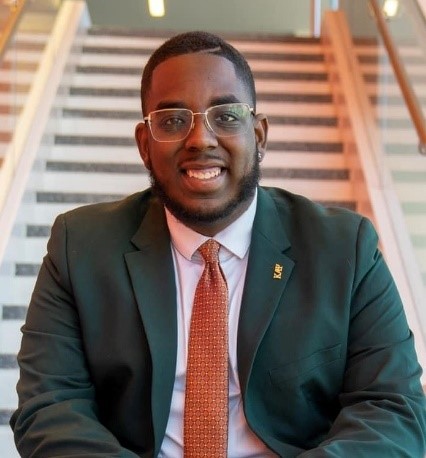
Did Newhouse open your eyes to new professions or aspects of your field you may have not considered when applying?
Newhouse opened my eyes to the endless possibilities of opportunity within the media field. I was not as knowledgeable when it came to media and advertising terminology prior to attending Newhouse. I knew I loved media but was not sure which road I wanted to take when it came to advertising. The advertising program prepared me for real-world scenarios that clients were facing post-COVID. It was during this time where I figured out that I may want to work on the entertainment side, specifically in sales.
What unique features of your graduate program drew you to it in the first place?
Newhouse being the top communication school in the country is what immediately drew my attention to the program. Also meeting people in the media field in NYC, you are bound to run into a Newhouse grad. That should say a ton about the production of media powerhouses Newhouse produces. Having done prior research, I knew that the advertising program took a hands-on approach in ensuring that students had the opportunity to work with real clients and quite frankly, the best of the best. Working with clients such as Snickers, Neiman Marcus and FOX Sports made the work enjoyable. While the program is an accelerated one-year program and can be deemed rigorous, I knew that I had made the right choice attending this institution.
Did the Newhouse Career Development Center aid you?
The Career Development Center would always send emails for different job opportunities and internships that would catch my eye. I applied to so many internships for the summer since I had to complete my capstone, and emails were sent daily for opportunities to apply. For any students interested in internships and job placements, I would definitely encourage you to walk by the Career Development Center. They are there to help and guide you to get you where you want to be!
What are some obstacles or misconceptions about your field that students ought to be aware of?
Within the media world, there are many obstacles you may face. At times work can be extremely busy, and you are sometimes required to work longer hours than expected. However, you are well compensated for your time and effort. Especially here at NBCU, food is always being brought in for late nights (for free!) and overtime is always a plus. Some may be worried about the money while first starting out (I know I was!), but the money will come. One thing about the media field is you can move up fairly quickly and make a great salary. The first few years may be tough, but climbing the ladder will be rewarding in the end. A Newhouse degree will definitely give you an advantage when applying to jobs at well-known agencies and entertainment networks.
What moments in your career have been most exciting or defining thus far?
Working with clients that I am familiar with daily has made my job enjoyable. The connections I’ve made in this industry have been nothing short of amazing. Thinking about my journey from undergrad to graduate school, and now working at a top media company, the hard work paying off has definitely been the most defining moment thus far. While I’ve only been at NBCU for a little over a year, I’m sure that more exciting moments will be coming my way.
What advice do you have for current or incoming students?
- Not knowing exactly what you want to do is okay! Newhouse professors will guide you in the right direction. Take advantage of office hours and the abundance of resources available at your disposal.
- Make as many connections as you can! You will thank yourself for reaching out and establishing these relationships in the future.
- Impostor syndrome can be normal; don’t let it consume you and know that you are here and were chosen for a reason.
The Power of Curiosity Fuels Award-Winning News Anchor Mary Calvi ’90
Mary Calvi’s early path to become an award-winning news reporter and anchor is a familiar one: Calvi ’90 fell in love with journalism at a young age, cultivated an intense curiosity and became determined to cover the news.
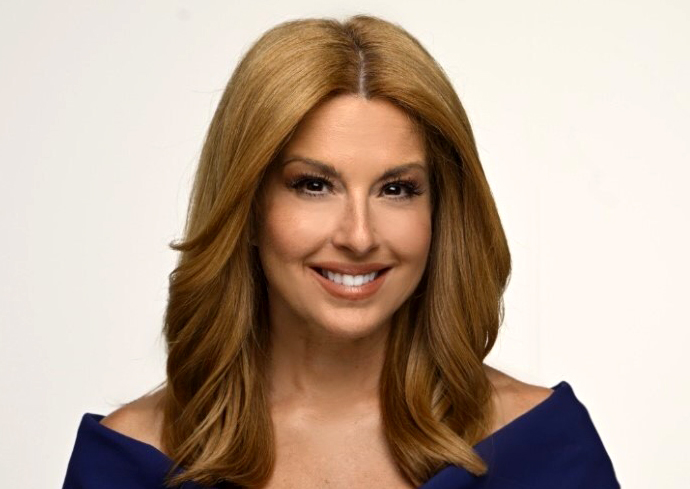
But it was that curiosity—combined with the confidence acquired through her broadcast journalism classes in the S.I. Newhouse School of Public Communications and a big break provided by Sandy Montag ’85, president of The Montag Group—that helped Calvi realize her childhood dreams while remaining appreciative of the powerful impact of the alumni network.
“I feel indebted to Syracuse University and the incredible alumni connections and the powerful reach of this network of alumni. We’re all so open to connecting and sharing our advice and feedback with each other, and there’s a tremendous camaraderie among the alumni,” says Calvi, a 14-time New York Emmy-winning anchor on WCBS-TV in New York and anchor of “Inside Edition Weekend.”
Choosing Local News Over Cartoons
While her childhood friends were watching cartoons, Calvi vividly remembers being enthralled with the local newscasts. There was something powerful, captivating and mesmerizing about how the on-air reporters delivered the news to Calvi, who grew up in Yonkers, New York.
When she was in the ninth grade, Calvi first got her hands on a microphone and camera and started writing and producing her own newscasts for a small local community television station in her hometown.
“I was doing really local news, talking about the upcoming festival or what was happening in and around town that weekend, but I loved it,” Calvi says. “It was the power of curiosity. I was always curious about what was happening, but also what was the reason behind what was happening.”
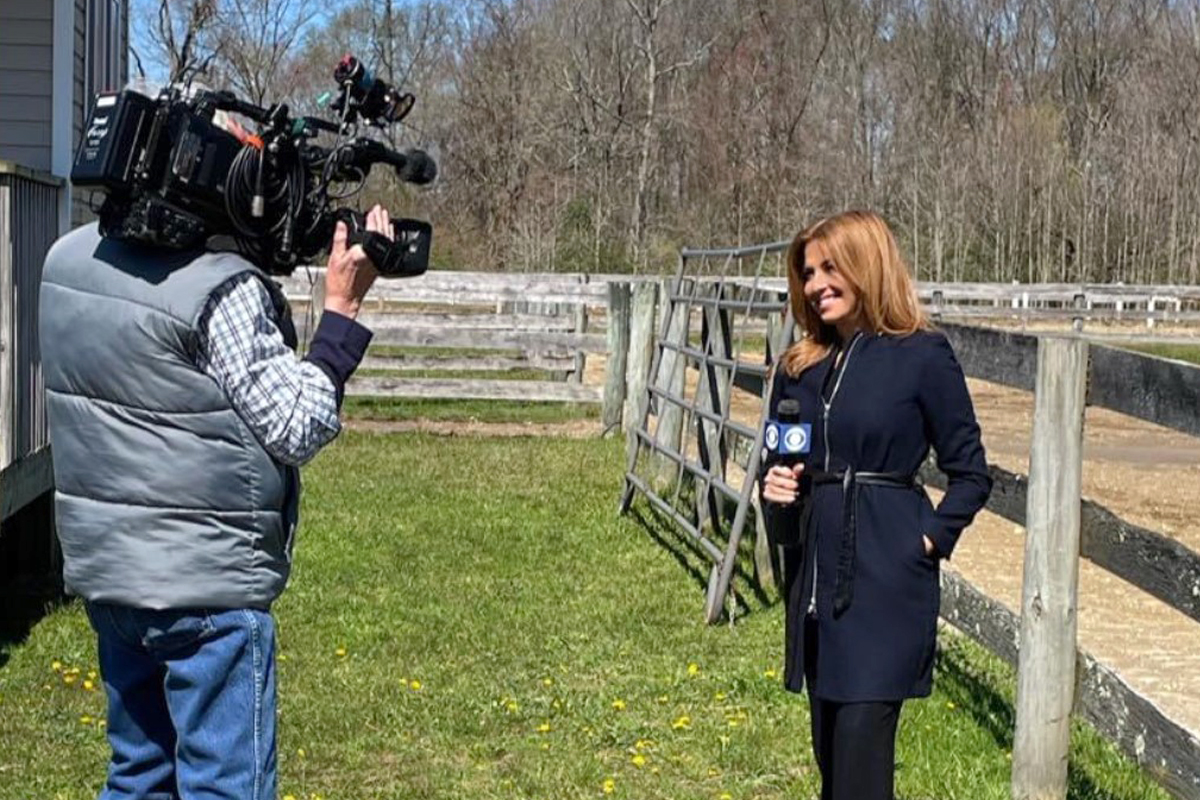
While anyone who watches Calvi deliver the news today can’t help but see her as a natural, it wasn’t until she arrived at Syracuse University to study broadcast journalism that Calvi discovered the confidence she would need to launch her on-air career.
“There was no better journalism school in the country, and there was no other place I wanted to go. But just because I knew this was what I wanted to do from an early age, didn’t mean I actually thought I could do this. It really took me having the real support and encouragement from my Newhouse professors that allowed me to become confident that I could go out and do this for a living,” Calvi says.
A Gift to Celebrate Life, Exploration and the Mother-Daughter Bond
It’s 10:30 a.m. in Sydney, Australia, as Ann Covitz ’62 answers the phone and reflects on her life from the other side of the world. Hers is a story that deserves to be told, and one no parent ever wants to experience. It’s about a final act of love to forever connect a mother and daughter, and a gift intended to bring light from darkness.

A Queens, New York, native, she always wanted to be a teacher, and friendly influences and a strong School of Education led her to Syracuse University. “My best friend Susan wanted to go to Syracuse, and it got to be a whole clique of people in the neighborhood who went,” she recalls. “It was too big a school for me, really. But I loved the area all around campus.”
One weekend she met David Covitz, a Cornell University student in the same fraternity as her brother. After Ann graduated from Syracuse, the couple married and settled near Cornell. They later moved to Long Island, where their daughter, Jill, was born. But Ann ran the household as David was frequently attending to his veterinary practice, and the marriage fell apart when Jill was 2 years old. Ann adapted as best she could, focusing on her teaching career and raising her little girl.
For 35 years Ann split her time between teaching and family therapy. She always loved children and became a Montessori School directress. She also organized parenting classes. Ann applied the lessons she learned as a single parent to help build up other families and guide schoolchildren in the same way she nurtured her daughter.
“She was such a happy kid—the girl whose perpetual, dimpled smile would light up the room,” Ann recalls. “I remember her receiving the ‘Friendliest Camper Award’ as a young child. They used to call her ‘bubbly’; she was very outgoing and made friends everywhere she went.”
A Love of Travel

Jill Covitz ’92 loved music throughout her childhood, especially bands. And while Ann admits Syracuse wasn’t the ideal choice for her, it was perfect for Jill, who joined Alpha Chi Omega sorority and majored in electronic media production at the S.I. Newhouse School of Public Communications. She loved the entertainment aspect of the music industry and aspired to work in events production.
Of all her Syracuse experiences, a semester abroad set the tone for the rest of Jill’s life. “Jill studied abroad in London and traveled all over Europe. She loved being in a group and exploring, especially being an only child,” Ann says. “She always had the travel bug, but Syracuse was the place that gave her the inspiration to live internationally.”
Jill graduated cum laude and spent over a decade in New York City, working for Columbia Records and Sony Music Entertainment. But she still wished to live in another part of the world and was drawn to Australia for its people and its beauty.
“Australians are very happy people—boundless. They have a light about them similar to Jill’s personality, and she loved the camaraderie,” Ann recalls. “She said, ‘Mom, one day I want to go to Australia. It’s just the place I want to be.’”
Newhouse to the NFL Network: Alumna Sara Ries ‘05 Oversees NFL Draft Coverage
The NFL draft weekend is one of the busiest times of the offseason for Sara Ries ’05, the senior director at the NFL Network. Almost a year’s worth of preparation culminates with a hectic, three-day event watched closely by dedicated football fans.
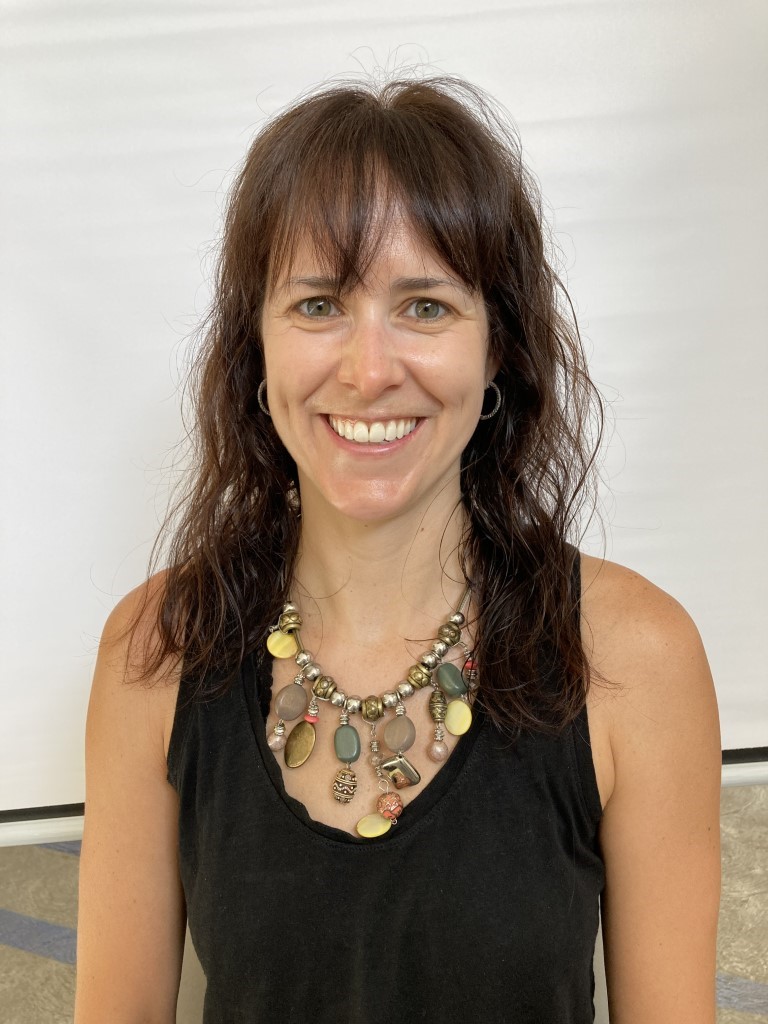
Ries, a broadcast journalism alumna, started as a production assistant for the network. She answered a few questions recently about how Newhouse prepared her for her career; covering the draft; her experience as a woman in a male-dominated field; and advice for students who want to get into the sports industry. Below are excerpts from her recent interview.
How did your Newhouse experience help you in your career journey?
I really feel that we gained a basis editorial background that we developed over the four years, and it was constant. And I think then you can kind of sprinkle in the other aspects because we were able to touch all the equipment nice and early at Newhouse. I loved that because I could take a camera out with me and shoot, there wasn’t a barrier to entry for that piece.
And so, then I could kind of not only be creative, but learn what I wanted to learn at my pace. And I did some work at the TV station on campus and the radio station as well because I thought the more I could do, the better. And that’s exactly what I took into my work here at the network, was the moment you walk in the door, just be ready to do anything. And whether it [would] be putting yourself out there and putting your hand up and saying “I’ll do it, I’ll learn it” or … just being ready to jump at any opportunity. That was something that Syracuse always helped kind of instilled in us and still to this day, I tell that to everyone.
The NFL draft has turned into a big offseason event for football fans. What do you like most about overseeing and producing draft coverage?
I really think what’s been cool about the draft is really making the city and the moment itself unique. How do we incorporate the music? How do we incorporate these big names that people know into our coverage? And how do we make those moments special? So, it’s unique every year. And honestly, at the end of the day, I feel just lucky to be a part of it.
And I’m here for the chaos, the trades and all the madness because that’s truly what makes it fun. And it’s like “boom,” we’ve got to go on to the next player, we’ve got to go on to the next team. And that kind of gives you the adrenaline rush that I think a lot of us got into live TV for.
Would you mind sharing your experience as a woman in sports, and give advice for women who are hoping to break into the industry?
When I first started, there were still very few women who were really, I think, visible to us. And that wasn’t just because we were in sports—we were pretty much never on TV. I mean, aside from the Olympics, there wasn’t that much coverage [of women’s sports]. I feel like we just weren’t really being seen, it was just about the women who were on TV. … I remember interviewing people at ESPN, some of their women were there when I did an internship, and I was just desperate to talk to them about what they had experienced. Because really, behind the scenes, there were two or three women, but that was it. I think there’s just been such a wave of women in industry and that I really hope it continues and it should be that way because we have to really be able to see and experience sports through everyone’s eyes before we can really make the coverage of sports fair and equal. You can’t just have one perspective.
The only way we can grow is for women to keep pushing their way in, keep wanting their voice to be heard, whether you’re on the sidelines as a fan raising your hand, or whether you’re really wanting to break into this industry. And just know that there are those of us here with welcome arms for whoever wants to join.
Newhouse Alumna Amanda Quick ’14, G’16 to be Recognized at University Alumni Awards Celebration
Syracuse University will honor eight distinguished members of the Orange community during the 2024 Alumni Awards Celebration, which are being held from 4:30-8:30 p.m. on Friday, April 12, 2024. The celebration, which is free to attend, will occur in the National Veterans Resource Center at the Daniel and Gayle D’Aniello Building (NVRC).
Attendees will have the opportunity to hear from several student organizations who will be fundraising for exciting projects, enjoy a spirited awards ceremony hosted by student Nicole Aponte ’24 and mingle with honorees and each other during a reception following the ceremony.
Traditionally held in the fall during Orange Central, the 2024 awards ceremony was shifted to the spring to facilitate greater interactions between award recipients and the Syracuse University student body. The honorees, selected by the awards committee of the Syracuse University Alumni Association’s Board of Directors, were selected for their achievements and success, truly highlighting what it means to be Forever Orange.
Amanda Quick ’14, G’16, a Newhouse alumna, will be awarded the Generation Orange Award, which recognizes graduates from the past decade for career success and community engagement, along with their overall commitment to Syracuse University.
Crossroads of the World: A Bandier Program Capstone Premieres in Times Square
The music video for “Moneybag” by musician 33col3 featuring Rich Amiri premiered on a billboard in Times Square on a November night in 2022.
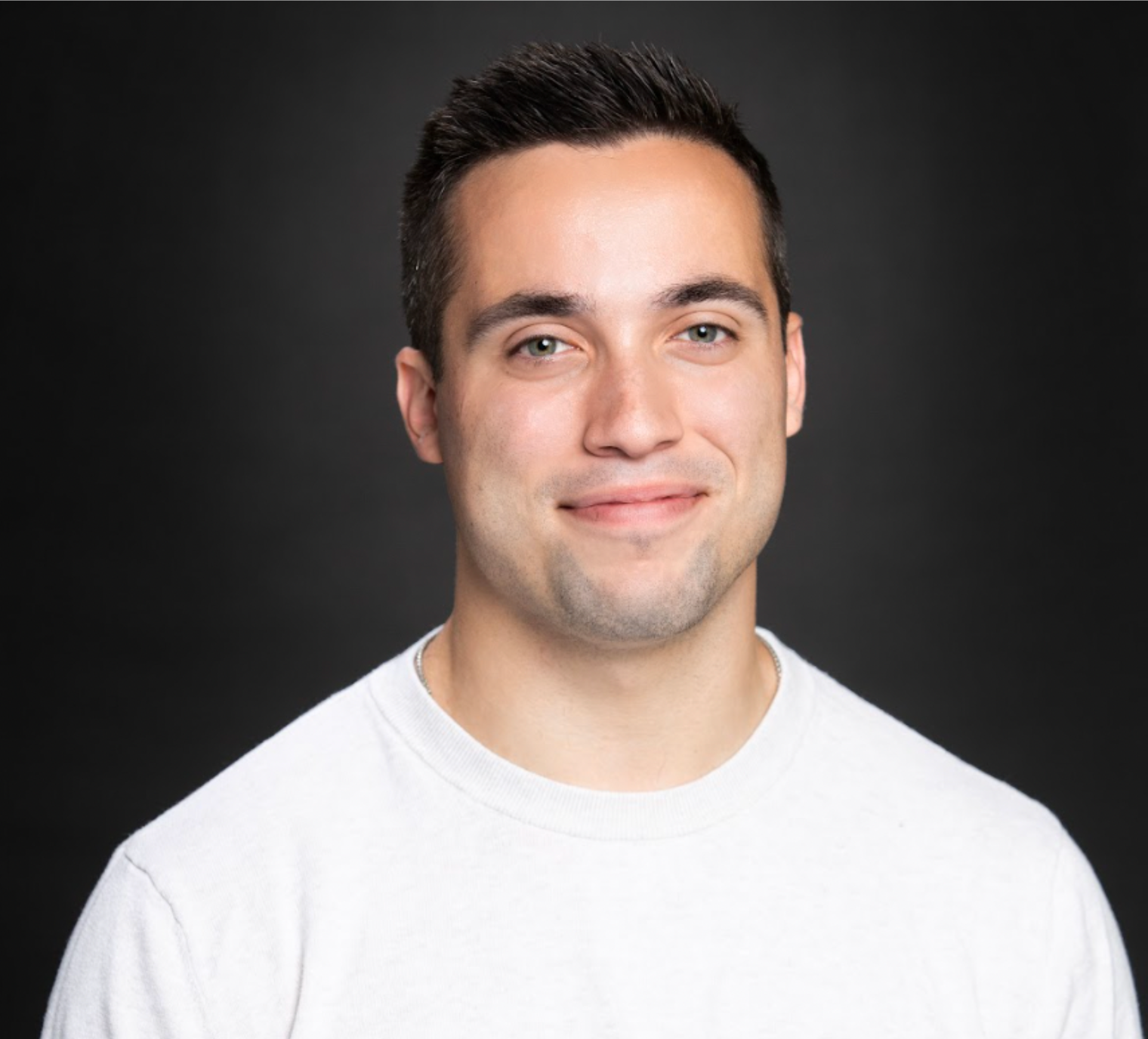
Little did the thousands of people watching know, the video had been produced in less than 10 days by a student-run music video production company 6Degree Productions, a business that originated from a capstone project by Ryan Hermann ’23.
Hermann is an alumnus of the Newhouse School’s prestigious Bandier Program for Recording and Entertainment Industries, named a top music business program by Billboard magazine. In the program he enjoyed the small class sizes, informative courses and a close-knit atmosphere.
“[Bandier] really allows you to get close to everyone, no matter what grade, and that’s what the music industry is. It’s all about connections,” Hermann said. “It’s all about who you know. It really just helps that you get along with everyone on the program.”
At the start of Hermann’s senior year in August 2022, he began working on his capstone, a semester-long project in which the assignment was to simply create a business.
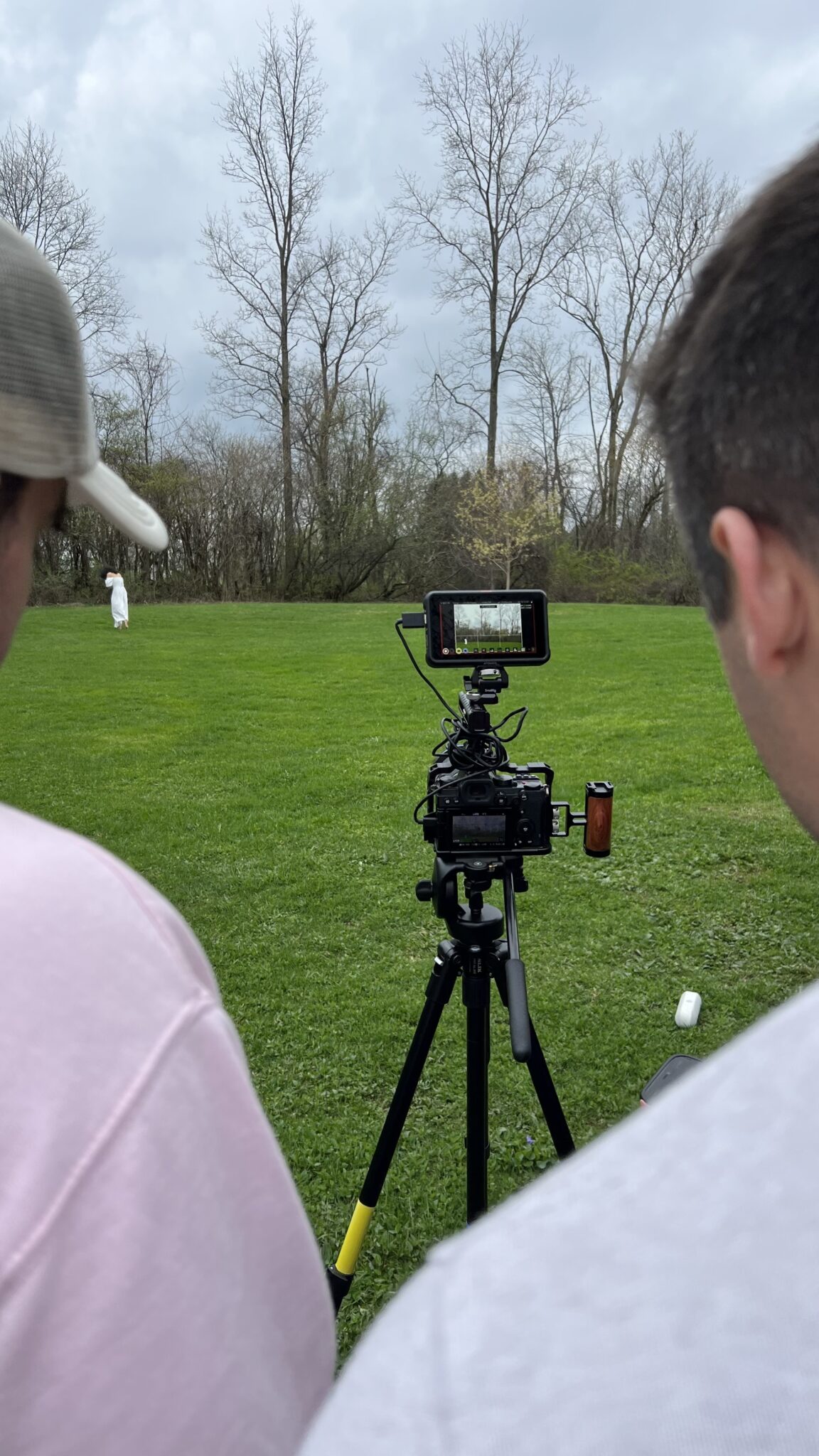
“What I’m trying to see from the capstone is students using real-world professional experiences to get outside of their comfort zone and learn as much as they possibly can about how they work best, how they produce the best results,” said Bill Werde, the Bandier program director.
Hermann decided to create a music video production company, inspired by his Atlantic Records internship the summer before senior year. As a video production intern, he worked on the set of various music videos, helping with casting, directing and production.
Having worked on both expensive and low-budget videos, “I realized that if you’re creative enough, you don’t need all the money in the world to create something amazing,” Hermann said.
With that realization and inspiration from music video director and producer Cole Bennett’s multimedia company, Lyrical Lemonade, Hermann got to work on creating 6Degree.
Through mutual connections, Hermann found five fellow Syracuse University students interested in his idea—Roger Moore, a cinematography and film/video production senior; Ashley Girouard, a communication design senior; Lena Osso, a television, radio and film senior; and two film and media arts students, sophomore Brandon Kim and junior Cabot Maloney—and created his team.
“I told them: ‘I know that all these artists don’t have all the money in the world. But I know that when we combine our creative ideas, we can do something amazing.’”
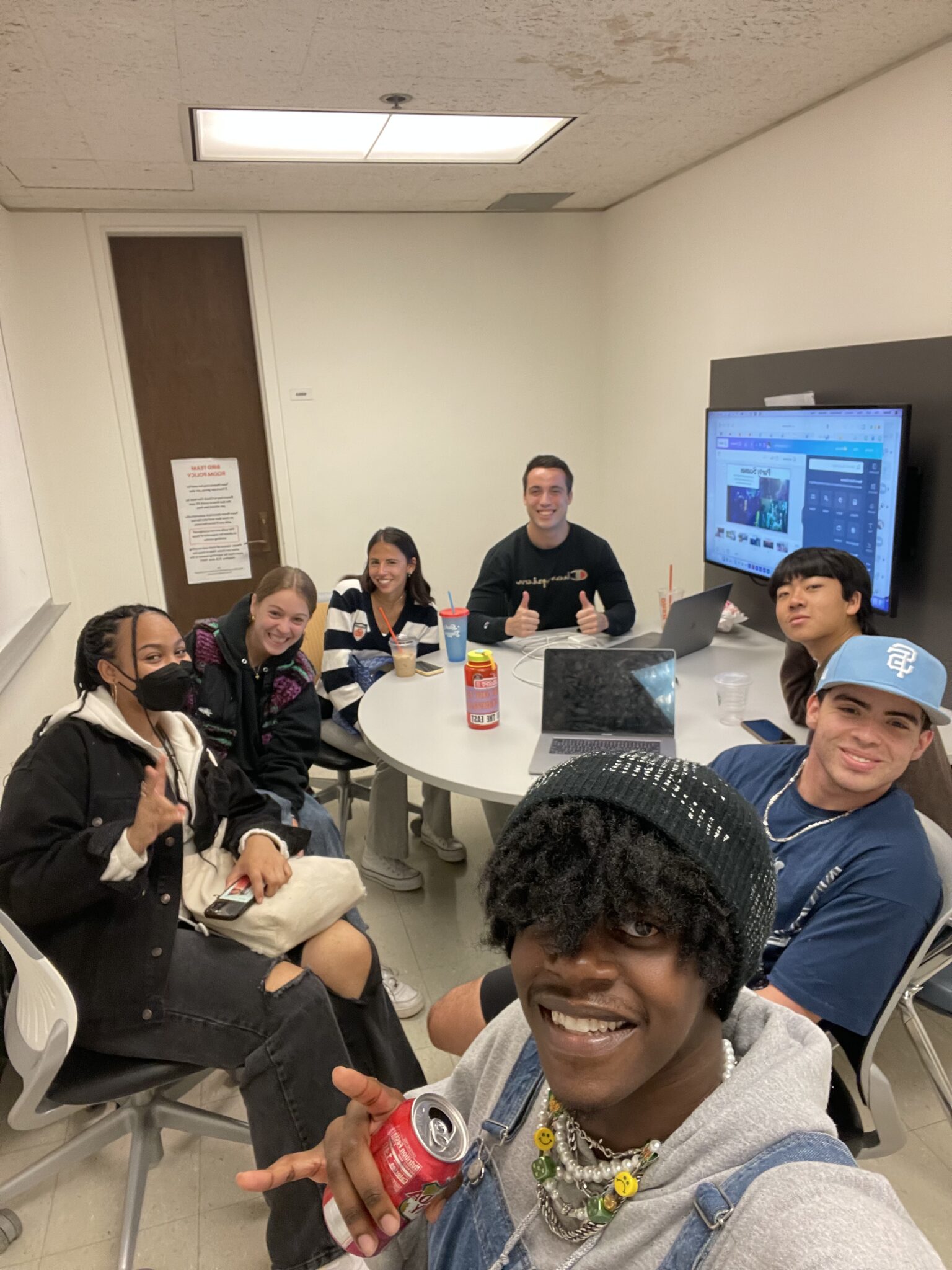
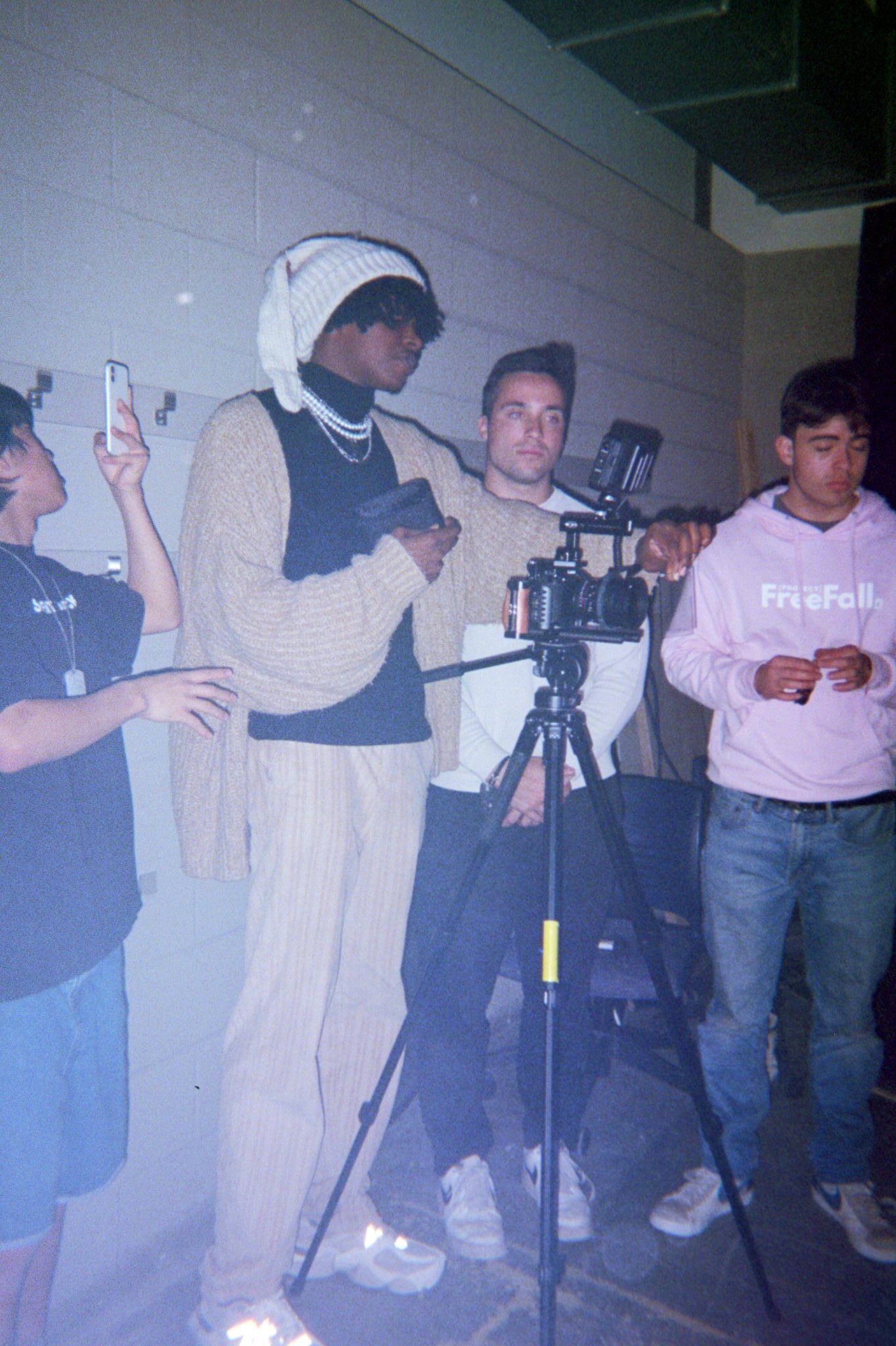
They got to work, spending hours in Bird Library and Food.com to find Syracuse-based artists who could be potential clients. As 6Degree’s leader, Hermann found and contacted artists, collaborated with them on ideas, orchestrated the shooting logistics and more.
Hermann’s company, which continued after the capstone class was over, released five music videos between November 2022 and October 2023, starting big with “Moneybag,” by fellow Bandier alumnus and musician Zach Dacierno ‘23, who releases music under the name 33col3.
The team shot, edited and finalized the video in 10 days after Hermann received a call from Dacierno saying that he signed a one-song deal with label Sun Pop and needed a short promo video to premiere in Times Square in less than two weeks.
“We were like ‘We have got to do this,’” Hermann said.
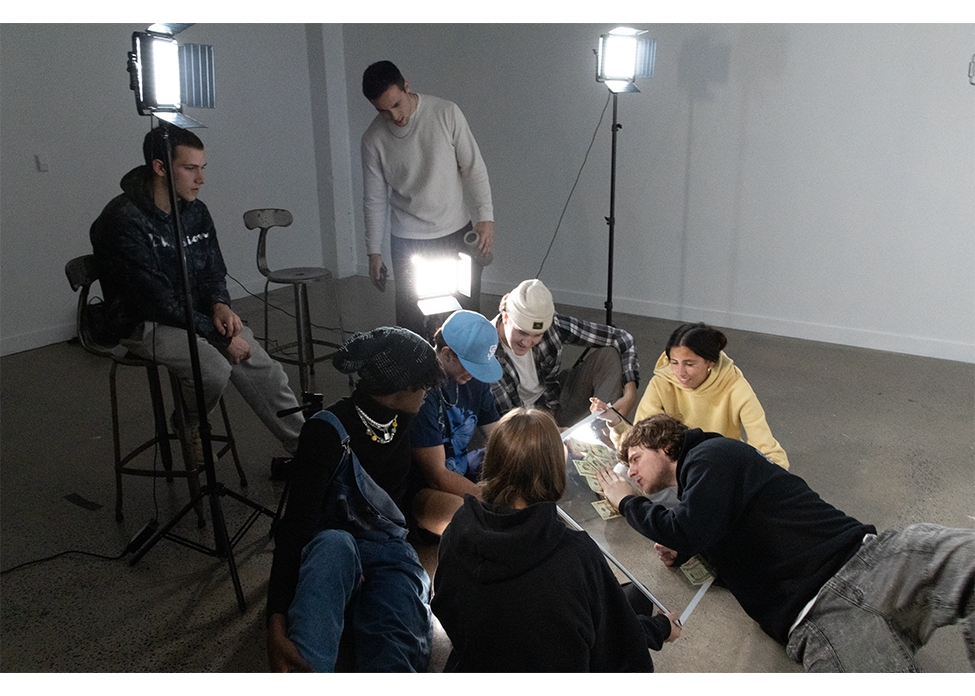
Hermann wasn’t able to get to Times Square to see the video premiere, but other members of 6Degree did, including Osso.
“[The premiere] was a super cool experience for us, especially as a new organization on campus,” Osso said. “To have such a mind-blowing experience as our first video, that kind of projected us towards other artists wanting to work with us, which was really cool.”
After the whirlwind experience, 6Degree completed a music video for BRI.’s “Never Around,” a hectic three-day shoot that included filming a car scene, a packed sorority house and a party. The chaos of the first two days made Hermann nervous about the party, “but it really went perfectly and that whole shoot was amazing,” he said.
Videos that followed were “Christmas On My Own” for Picture Us Tiny, “Goodnight, Friend” for Lauren Juzang and “Messy Room” for Sammy Curcuru, Hermann’s personal favorite video.
After Hermann graduated in May 2023, 6Degree went on hold as the founding members moved on to pursue their own careers. Hermann hopes to one day continue the production company in the future; at the same time he just started an internship as an emerging talent associate for Elektra Entertainment in New York City.

“I think I will do some stuff and eventually just put it on 6Degree. It’s shelved right now, but we’ll see if it could be continued,” he said.
For Hermann, 6Degree was an opportunity to build a project from the ground up, and navigating through hectic, last-minute shoots forced him to be a decisive leader.
“Ryan led with his passion, which I think is one of the best ways to jump into building a business,” Werde said. “I think he picked an art form and a part of the business that he had been dedicated to and he built his own, and I think that’s incredible.”
Griffin Uribe Brown is a sophomore in the magazine, news and digital journalism program at the Newhouse School.
Master’s Alumni Profile: Claribel Rivas G’20
Claribel Rivas G’20
Newhouse Master’s Program: Magazine, News and Digital Journalism
Current Position: Social Media Manager, PBS Digital Studios in Arlington, VA.
How did you obtain your current position, and what positions did you hold before it?
In November 2020, I was offered the Gwen Ifill fellowship at Washington Week where I managed the Instagram account which the team was really interested in growing. After my fellowship was over in June 2021, I was offered a position as a senior social media manager for the National Digital Content team at WETA. There, I worked with the digital content team and producers to come up with social media strategies for campaigns, identify best practices to build viewership across broadcast and online programs, as well as oversee the social accounts for WETA programs. In December 2021, I was offered a social media manager position at PBS Digital Studios, working my way up to the PBS headquarters in Arlington, VA.
What’s an average day like for you on the job?
PBS Digital Studios is a network of educational digital shows distributed on YouTube. The show topics range from STEM to music and arts. I start my day looking through any messages from the producers we work with and see if there is anything I need to review for the day. Some of the things I would review would be rough cuts of social videos, final cuts of social videos, social scripts or social assets that our show producers send us to help promote their series. Once I go through the reviews and approve them, I head over to our social calendar and see what is scheduled to be published for the day. I try to block time on my calendar for up to two hours to focus solely on publishing. Once all the posts are scheduled for the day, I attend any meetings on my schedule. Usually, our meetings are to catch up with producers and check in on how the show is going. We talk through episode ideas, social video ideas, episode schedules or any other agenda items. Once meetings are done, I usually have a few more posts that need to be published so I’ll go back and see what I’ve missed and make sure they are good to go. I also take time in the afternoon to review/moderate our comment section and respond/flag to anything that needs our attention.
How do you feel Newhouse prepared you for your current position?
Newhouse prepared me for my current position by providing a wide range of classes that helped build my skillset. From magazine writing classes to video production classes, I graduated with essential design and creative skills that would be useful for any job. Since graduating, I have used almost all of the skills I learned at Newhouse. I’ve had to manage websites, create graphics, edit social videos on Adobe, present in front of an audience and use my storytelling skills in all aspects of writing and design. Newhouse taught me so many great real-world professional skills, and I felt more than ready to enter my career after graduation.
Did Newhouse open your eyes to new professions or aspects of your field you may have not considered when applying?
After graduation, I was certain I was going to go straight into reporting for a digital magazine. However, the skills that I learned at Newhouse were transferable for a variety of different jobs. Social media was already an interest of mine, and I didn’t realize that there was more to being a social media manager than just posting on Instagram. Although publishing and managing our social calendar is a big part of my job, I also act as an editorial/social lead for some of our YouTube shows. I work with producers to craft entertaining and educational stories through social media video, while also ensuring each video meets our editorial standards and expectations. Creative storytelling is a big part of what I work on at Digital Studios and Newhouse was able to prepare me for a role that entailed the skills needed for this.
What unique features of your graduate program drew you to it in the first place?
What drew me to the magazine, news and digital journalism program was the Newhouse Diversity News Fellowship. This fellowship was granted to two students interested in the program who majored in something other than journalism in undergrad. The fellowship seemed like a great opportunity for someone like me who was interested in pivoting to reporting, especially since I had a growing interest in international reporting. Syracuse was the only school I applied to for my graduate degree, and I wanted to take a chance at being accepted into the fellowship program. I was selected as a semi-finalist and was able to receive a full-tuition scholarship to attend Newhouse! Since the program was only a little over a year long, I quickly applied to positions that would help make my resume stronger and enhance my skills, as well as trying new journalism avenues that I didn’t get to do during undergrad. I interned at NewsChannel 9 as a show intern, worked at Orange Television Network as the Promotions Manager, and even tried some broadcast roles as a bilingual reporter for Noticias on CitrusTV. There were so many great opportunities on and off campus.
Did the Newhouse Career Development Center aid you?
The Newhouse Career Development Center was helpful in connecting me with alumni that were working in positions I was interested in, as well as in the city I was hoping to move to after graduating. There were many classes where alumni would come speak to students and have an hour to network, exchange contacts and allow us to ask questions. It was all really inspiring to me to hear from alumni that were in my shoes not too long ago, and now able to share their success with students. It made me hopeful for the future.
What are some obstacles or misconceptions about your field that students ought to be aware of?
Working in journalism can be incredibly fun and rewarding. There are many opportunities to be in rooms with amazing people, travel across the country and help give a voice and platform to people who are often underrepresented or overlooked. However, even after graduating with a master’s degree, I quickly realized that I wasn’t going to start off with the most amazing salary, or even a senior-level role. Before attending Newhouse, I already had a full-time job and was on my way to moving up the ladder. Once I graduated from Newhouse, I had to pretty much start over as an intern again and work my way up. Although I worked my way up pretty quickly, I learned that sometimes you have to take a few steps back to get into the position and field that you want to be in. Only now, with a degree from Newhouse, you are much smarter, wiser, better connected and have a strong skillset to take on any role.
What moments in your career have been most exciting or defining thus far?
Every day I get to work with some of the smartest creators on YouTube. It is so cool to see how a video idea comes to life from start to finish and knowing that I was involved in part of the process makes me really proud. One of the most exciting moments was when I attended the YouTube conference Vidcon in Los Angeles and represented PBS Digital Studios. I had dreamed of attending Vidcon ever since I was 12 years old. It’s an opportunity to meet famous YouTube creators and hear their success stories. My parents couldn’t afford to send me, so I would just watch the recaps on YouTube. Being able to attend years later, as a representative for PBS and networking with other industry professionals felt like a full-circle moment. I felt like I was making my younger self so proud!
Another moment is connecting with Syracuse students at Newhouse DC! I had connected with Cheryl Brody Franklin, and she offered me the chance to be on the alumni panel for Syracuse students spending a semester in DC. It was an exciting experience because I also remember being a student, eager to learn from alumni, and now I get to share some of my knowledge! Another full circle moment.
What advice do you have for current or incoming students?
Really take advantage of your time at Syracuse and try new things! Even try things that you think you won’t enjoy and see if you can prove yourself wrong. It may surprise you! I would definitely recommend taking Corey Takahashi’s class in multimedia journalism. It really helped me think outside the box and learn how to be a creative storyteller through a bunch of different mediums. The skills I learned in that class come up in my professional life every day. From storyboarding, to identifying b-roll, to scripting, this class prepares you for any creative role you may have upon graduation.